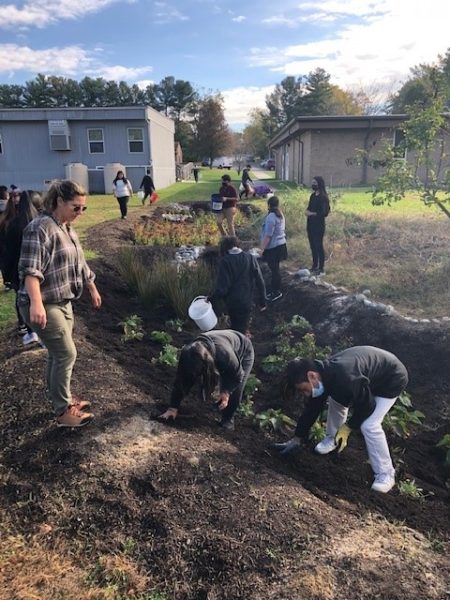
After being mulched and planted, the rain gardens at Bridgeton’s Indian Avenue School are now working to improve water quality in the Cohansey River and the Delaware Bay.
The American Littoral Society was joined recently by several classes of students from Mr. Vena’s 8th grade and 6th grade classes. Over the course of two days, the students worked hard to fill the six gardens with native plants and cover them with mulch. The garden sites were dug out by the Littoral Society Restoration Corps interns over the summer.
How do rain gardens off Jackson Run – a Cohansey River tributary – connect to the health of the Delaware Bay? It’s all about stormwater runoff from impervious surfaces and the interconnection of the whole watershed.
Green stormwater infrastructure, such as rain gardens, encourages rainwater to flow into the aquifer rather than running off sealed surfaces like parking lots into our rivers and streams, which lead to the bay. It’s healthier for the water to slowly percolate into the soil, which filters out pollutants. Besides keeping pollution out of the bay, the rain gardens also help slowly replenish the local aquifer – which provides drinking water to people living in the area. Rain gardens and similar structures highlight the connection between surface water and groundwater. Our rivers, streams, lakes, and freshwater wetlands are all at low points in the land that dip below the water table, which is where the Kirkwood-Cohansey Aquifer starts. If the water in the aquifer dries up, those surface water bodies also start to dry up.
As a result, this interconnection isn’t just about water quality or making sure that the water is clean and unpolluted, but also about quantity – the life in estuaries requires a proper balance of salt and fresh water. The rain gardens at Indian Avenue School will specifically help to capture and filter stormwater runoff that would otherwise bypass the aquifer and flow into the bay.
Sites for the rain gardens were prepared during the last full week of the R-Corps internship (which also happened to be one of the hottest weeks of the summer). Working together with Rutgers Water Resources Center, the interns leveled the garden beds, spread out the sand and compost mixture that was dumped on top, covered it with mulch, and dug trenches for the pipes that would drain from several downspouts on the school and an annex building. Staff from the Water Resources Center showed some of the interns how to use the depth sensing equipment and how to read engineered blueprints.
We are very grateful to everyone involved for getting all this work done in 90+ degree weather!
The last two steps were completed by the students from the school. Planting native plants and adding additional mulch will help to ensure the project’s success and add to the environmental benefits.
Although the earth does most of the work of filtering out pollutants, plants can also help take up excess nitrogen and phosphorus from fertilizers, which would contribute to eutrophication. Excess nutrients of this kind can lead to harmful algae blooms and lowered dissolved oxygen levels in streams, rivers, lakes and bays.
Using native plants has the added benefits of providing food to the local pollinators and lowering maintenance needs, since the plants are suited to living in the local climate. Mulch helps to keep out weeds and lessens watering needs by shielding the soil from direct sunlight, thereby lowering evaporation.
The Littoral Society would like to send a heartfelt THANK YOU to Indian Avenue School for partnering with us on this and so many other projects, including these rain gardens, a riparian-buffer tree planting, two rainwater cisterns to water their community garden, and the upgraded water-efficient restroom fixtures they are going to install as part of our Water Champions program.
These projects have made this school has a shining example of responsible water stewardship in Bridgeton and the whole Delaware Bay Watershed!
